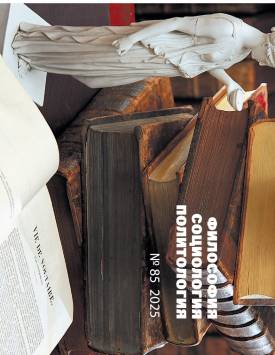Destructive elements of online communication
The article examines the phenomenon of destructive online communications, defines some of their characteristics. The issues of counteracting these processes are considered. A critical analysis of the options for solving this problem is carried out. Problematic issues are formulated, which, in the author’s opinion, are the most important in understanding modern processes in the transformation of society, the gradually forming knowledge society, the development of artificial intelligence. The article emphasizes that the category of destructiveness is key to understanding modern processes in online communications. The philosophical understanding of destructiveness has its own history, interdisciplinary status, and is promising from the point of view of understanding many social processes. These processes are considered in the context of informatization and digitalization as dominant trends. The author proposes a qualitative characteristic of the subject of modern digital media - “universal digital communicator”. This characteristic contains an open set of features of such a subject and it is concluded that such “generalists” perceive public communications as a kind of a technical task to influence the audience in their interests. This subject is influenced by the entire set of public professions and rarely adheres to any industry or professional ethical standards. His main task is to extract personal benefit from fame. Such “influencers” appear because of the erosion of ideas about journalistic work and professional industry ethics. The article considers some aspects of ethical standards in relation to online communications, as well as in the field of development of responsible artificial intelligence, which in the future could become one of the tools of information hygiene, critical understanding of information presented in new media. A number of destructive phenomena in the social and humanitarian sciences also contribute to the strengthening of negative trends in the information space. Conclusions are drawn about the need for a philosophical basis and scientific outlook for the formation of media literacy of citizens. The author declares no conflicts of interests.
Keywords
destructiveness,
destructive communication,
fake,
bot,
deepfake,
manipulation,
responsible artificial intelligence,
digital ethicsAuthors
| Druzhinin Andrey M. | Moscow Pedagogical State University | www-222@yandex.ru |
Всего: 1
References
Yanovskaya O., Yanovskaya O. Digital inequality of Russian regions // Sustainable Development and Engineering Economics. 2022. No. 1(3). P. 77-98.
Robinson L. et al. Digital inequalities and why they matter // Information, communication & society. 2015. Т. 18, № 5. С. 569-582.
Дьякова А.А. Деструктивность педагогического дискурса как актуальный контент в блогах учителей // Современный дискурс-анализ. 2023. № 2 (33). С. 17-27.
Евграфова О.Г., Зиганшина Н.Л., Хаснутдинова С.В. Реализация категории деструктивности в американском политическом дискурсе // Глобальный научный потенциал. 2024. № 8 (161). С. 220-224.
Филатова А.Ф., Костромина С.Н. Целостность и интеграция личности в процессе переживания собственной деструктивности // Вестник Пермского университета. Философия. Психология. Социология. 2024. № 3. С. 411-428.
Калинина Е.Ю. "Черная легенда" об Испании: политическая мифология и образы идентичности // Нации и этничность в гуманитарных науках: Этнические, протонациональные и национальные нарративы: формирование и репрезентация, Санкт-Петербург, 24-26 февраля 2015 года / под ред. А.Х. Даудова, С.Е. Федорова. СПб.: Алетейя, 2016. С. 374-381.
Юрчик Е.Э. "Черная легенда" в испанской просветительской литературе // Электронный научно-образовательный журнал "История". 2011. № 8. С. 17-18.
Тяпин И.Н. Концепция гендерного конструирования: этико-гносеологический анализ // Философия и общество. 2020. № 1 (94). С. 96-115.
Рыжова К.И. Роль основных социальных медиаплатформ в президентских выборах в США в 2016 г. // Вопросы национальных и федеративных отношений. 2019. Т. 9, №4 (49). С. 495-499.
Ключевский Д.С. Особенности использования социальных сетей в президентских кампаниях 2016 и 2020 гг. в США: сравнительный анализ // Журнал политических исследований. 2021. Т. 5, № 3. С. 172-180.
Тирранен В.А. Преступления с использованием искусственного интеллекта // Развитие территорий. 2019. № 3 (17). С. 10-13.
Лукина Ю.В. Использование дипфейков в общественно-политической жизни // Русская политология. 2023. № 2 (27). С. 41-48.
Бычков М.В. Злонамеренное использование дипфейков: предпосылки, последствия, противодействие // Евразийский союз: вопросы международных отношений. 2024. Т. 13, № 3 (56). С. 634-647.
Masood M. et al. Deepfakes generation and detection: State-of-the-art, open challenges, countermeasures, and way forward // Applied intelligence. 2023. Vol. 53, № 4. Р. 3974-4026.
MustakM. et al. Deepfakes: Deceptions, mitigations, and opportunities // Journal of Business Research. 2023. Vol. 154. Р. 113-368.
Social Media Seen as Mostly Good for Democracy Across Many Nations, But U.S. is a Major Outlier https://www.pewresearch.org/global/2022/12/06/social-media-seen-as-mostly-good-for-democracy-across-many-nations-but-u-s-is-a-major-outlier/(accessed: 15.01.2025).
Новодережкин А. Крупнейшие российские N-компании и СМИ подписали в ТАСС меморандум о борьбе с фейками. URL: https://tass.ru/ekonomika/12604685?ysclid=llozddi-bse383750692 (дата обращения: 15.01.2025).
FloridiL. Soft Ethics and the Governance of the Digital. Philos. Technol. 31, 1 8 (2018).
Самсонов Д. Все страхи мира: чего боятся создатели Кодекса этики искусственного интеллекта. URL: https://www.forbes.ru/tekhnologii/444503-vse-strahi-mira-cego-boatsa-sozdateli-kodeksa-etiki-iskusstvennogo-intellekta (дата обращения: 15.01.2025).
Овчинникова О.П., Лебедева Д.В., Парм О.Я. Ответственный искусственный интеллект в управлении современной компанией // Инновации в менеджменте. 2024. № 1 (39). С. 26-31.
Германов Н. С. Концепция ответственного искусственного интеллекта - будущее искусственного интеллекта в медицине // Digital Diagnostics. 2023. Т. 4, № S1. С. 27-29.
Сорина Г.В., Гуров Ф.Н. Принуждение к идентичности. Как это возможно? /// Вестник Воронежского государственного университета. Серия: Философия. 2022. № 3 (45). С. 39-48.

